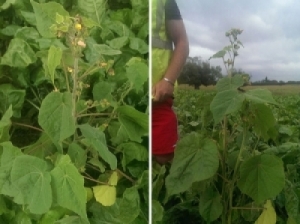Velvetleaf: New Zealand’s most aggressive cropping weed
Velvetleaf (Abutilon theophrasti) is an annual broad-leaved herb, originating in China, that can grow between 1 and 2.5 metres tall, with large heart-shaped leaves and yellow-orange flowers.
 Left: Velvetleaf plant in fodder beet crop. Right: Velvetleaf plants grow from 1m to 2.5m tall. Image: MPI.
Left: Velvetleaf plant in fodder beet crop. Right: Velvetleaf plants grow from 1m to 2.5m tall. Image: MPI.
Bay of Plenty Regional Council biosecurity staff are warning local landowners to check that machinery is clean and stock are empty before allowing them through their gates this Gypsy Day.
Gypsy Day (June 1) is traditionally the first day of the new dairying season when sharemilkers load their cows into stock trucks or herd stock on roads and move equipment and families to new farms.
"Velvetleaf is not just a fodder beet seed issue. The Waikato Regional Council has been working to contain a velvetleaf infestation found in Waikato maize crops and silage," says Bay of Plenty Regional Council biosecurity manager Greg Corbett.
"Velvetleaf is just one of many pasture weeds we're working hard to keep out of the Bay of Plenty. Along with Noogoora bur and alligator weed, its seeds or plant fragments can easily be carried from one property to another in stock faeces, hooves, fur or soil attached to machinery. It's important that landowners protect their land and livelihoods by being their own border control."
Bay of Plenty farmers can keep invasive pasture weeds off their farms by checking where maize feed, stock or machinery has come from and making sure it's not bringing any unwanted pests with it when it comes onto their farm.
Corbett says key precautions landowners should take are to ask contractors and new tenants to remove all visible soil and plant matter from their machinery and stock, before they leave their last location.
"Allowing stock to empty out before transport will also reduce the risk of seed being spread through cow dung," says Corbett.
More information about pasture weeds and machinery hygiene is available at www.boprc.govt.nz/pestplants
South Island dairy farmers will soon be able to supply organic milk to Fonterra.
Norwood has announced the opening of a new Tasman dealership at Richmond near Nelson next month.
Buying or building a rural or semi-rural property? Make sure you know where the wastewater goes, says Environment Canterbury.
With collars on more than seven million cows worldwide, Nedap says its standalone launch into New Zealand represents world-leading, reliable and proven smart technology solutions for dairy farmers.
Entries have opened for the 2026 Fieldays Innovation Awards.
Animal welfare is of paramount importance to New Zealand's dairy industry, with consumers increasingly interested in how food is produced, not just the quality of the final product.
OPINION: There will be no cows at Europe's largest agricultural show in Paris this year for the first time ever…
OPINION: Canterbury grows most of the country's wheat, barley and oat crops. But persistently low wheat prices, coupled with a…